As the worst of the pandemic has ended and our adolescents have resumed in person school,
activities, and general busy-ness akin to pre-pandemic lives, what have we seen as
psychologists in terms of the mental health of our adolescents?
Anxiety and depression continue to increase in adolescents despite no longer being physically
isolated like during pandemic times.
Increased social media use, which can lead to feeling excluded and increased negative social
comparisons with peers.
Social connection continues to come from virtual outlets and social media, sometimes at the
expense of in person social interactions with peers and friends.
Adolescents continue to not get enough sleep, which exacerbates the mood, stress, and anxiety
concerns.
Difficulty advocating for themselves and managing conflict. They need practice with these skills
after not using them as much during the pandemic.
Moodiness in adolescents is natural and expected. We need to look out for our adolescents
having low, anxious, or angry moods that last for more than a day or two at time, using
unhealthy coping strategies to manage their emotions, or any talk of self harm. So what can we
do about these trends? Lisa Damour, the author and psychologist says it best, “Mental health is
not about feeling good,” she writes in “The Emotional Lives of Teenagers.” “Instead, it’s about
having the right feelings at the right time and being able to manage those feelings effectively.”
Let our adolescents express their emotions in their own way. That may mean talking to a
trusted adult such as a parent, or putting on a sad playlist of music in their room, going for a
walk, or venting to their friends. Try not to accidentally reinforce their anxiety by letting them
avoid things that make them anxious because then they never get to test their fear and see that
they have the ability to handle the things that make them nervous and those things aren’t as
scary as they seem. If more help seems warranted, a clinical psychologist or other mental
health professional can help teach your adolescent coping strategies and serve as an additional
outlet for processing and managing all the complicated and challenging feelings of adolescence.
Dr Allison Resnick, PsyD
https://www.drallisonresnick.com/
